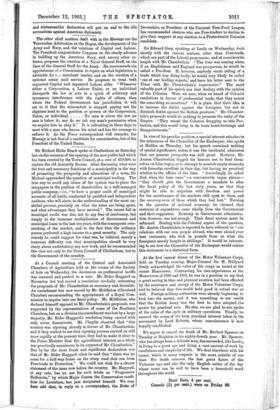In view of his peculiar position, a special interest attaches
to the utterances of the Chancellor of the Exchequer, who spoke at Halifax on Thursday; but his speech contained nothing of special significance, unless it was the incidental admission that our present prosperity was still great. However, Mr. Austen Chamberlain begged his hearers not to feed them- selves on false hopes, or to attempt to nourish empty stomachs with formulas excellent in their day, but having no practical relation to the affairs of the time. "Accordingly he asked that, when the time came "—a conveniently vague phrase— "they should give the Government a mandate to alter the fiscal policy of the last sixty years, so that they might be able to negotiate with freedom and power for the maintenance of the markets still open to them, and the recovery even of those which they had lost." Turning to the question of national economy, he claimed that restraint of expenditure came wholly from the Government and their supporters. Economy in Government administra- tion, however, was not enough. Their fiscal system must be reformed. Dealing with the Colonial aspect of the question, Mr. Austen Chamberlain is reported to have referred to "our relations with our own poop le abroad, who were alread your best customers, who took in pounds from us what the foreigners merely bought in shillings." It would be interest- ing to see how the Chancellor of the Exchequer would reduce this statement to a statistical form.


























































 Previous page
Previous page